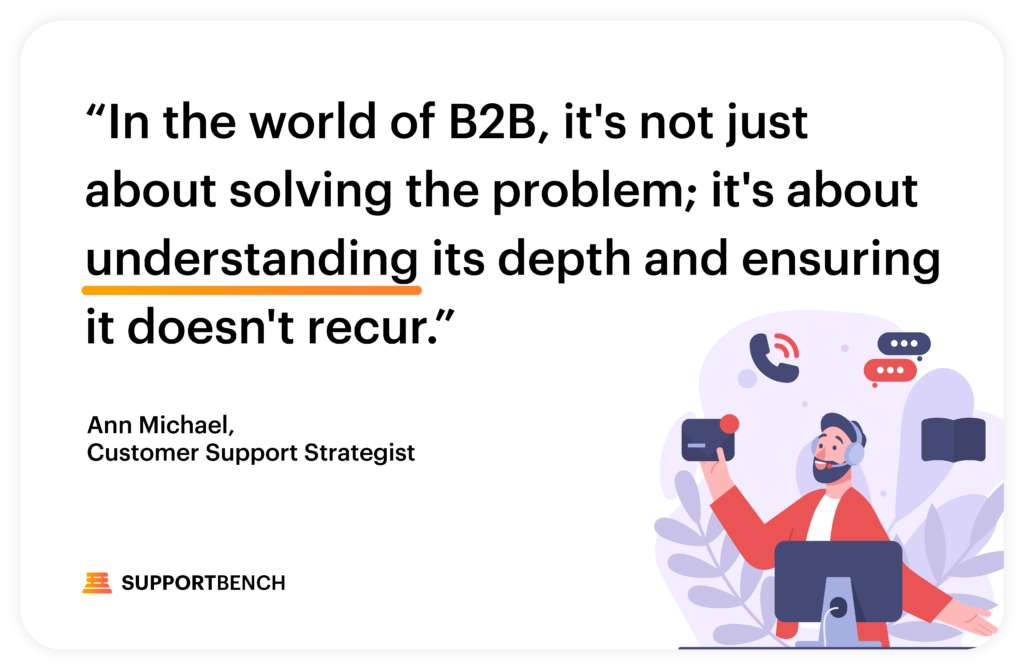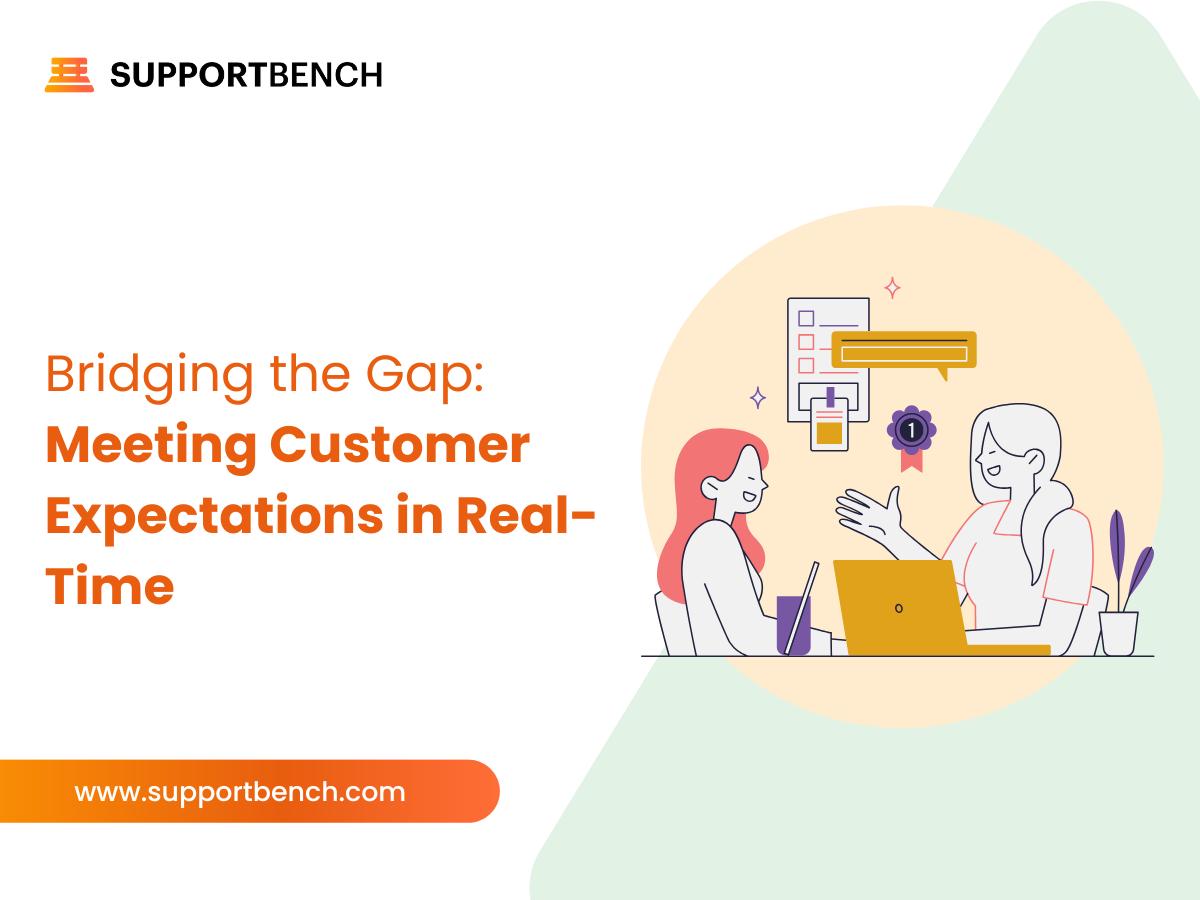In the bustling realm of business-to-business (B2B) enterprises, the customer support function plays a pivotal role. While support professionals have always been revered as the frontline soldiers of any business, the unique challenges that come with the B2B domain make their jobs even more complex and demanding. Sadly, one major stumbling block for many of these professionals isn’t just the inherently intricate nature of B2B issues but the lack of specialized tools designed to cater to their specific needs.

The Frustrations of Square Pegs in Round Holes
So, imagine being handed a screwdriver to do a job that requires a hammer. While both are tools, the screwdriver, despite its value, is grossly inadequate for the task at hand. This is the quandary that many B2B support professionals find themselves in. Generic customer support platforms, often lack the nuance and specificity needed to navigate the labyrinthine corridors of B2B support. Let’s examine four of the main issues:
- Complex Stakeholder Landscapes: Unlike B2C, where interactions are mostly one-on-one, B2B support professionals often juggle multiple stakeholders from the client’s side. Each comes with their unique perspectives, concerns, and requirements. Generic tools rarely offer features that allow agents to efficiently manage and engage with multiple stakeholders within a single organization.
- Longer Support Lifecycles: B2B issues, owing to their complexity, often have longer lifecycles. Without a platform designed to track and manage prolonged interactions, support professionals can easily become overwhelmed, leading to slower resolutions and, consequently, frustrated customers.
- Integration Hurdles: B2B enterprises employ an array of tools and systems, from CRM platforms to bespoke software solutions. Integrating these with generic support platforms can be a logistical nightmare, often leading to fragmented workflows that hamper efficiency.
- Depth Over Breadth: B2C platforms are designed to handle a vast volume of relatively simpler queries. In contrast, B2B queries, while fewer, are much more intricate. Support professionals often find themselves using platforms optimized for breadth, not depth.
A Plea from Professionals: A Platform Tailored to B2B
Jane Roberts, a seasoned B2B support veteran, aptly summed up the sentiment when she said, “Working in B2B support without a platform tailored to our needs is like trying to catch fish with a tennis racket. It’s not that it’s impossible, but it’s unnecessarily hard.”
So, what do B2B support professionals truly need? Let’s take a look at 4 urgent needs:
- Multi-stakeholder Management: A feature that allows support agents to seamlessly interact with and manage multiple stakeholders from a single client organization.
- Extended Lifecycle Tracking: Tools that enable agents to effectively manage, track, and address queries that span prolonged durations.
- Effortless Integration: A platform that can easily integrate with the diverse toolset employed by B2B enterprises, ensuring fluid data flow and streamlined operations.
- Deep-Dive Features: Tools and features designed to delve deep into issues, facilitating thorough problem-solving instead of surface-level fixes.
But when you’re a B2B company working with a B2C platform, addressing all of this can be entirely overwhelming. You know the frustration, but the fix seems like a heavy lift. But right now, with AI being fully embedded in newer support platforms, this might well be the most effective time to switch to a customized B2B support platform.
And, according to a 2022 Gartner report, 80% of B2B enterprises believe that a specialized support platform is crucial for their success. Let’s delve a little deeper into why B2B-focused platforms, especially those crafted by experts in the field, are transforming the world of customer support and what you can do right now to dramatically help your organization.
1. Enhanced Data Protection and Compliance:
B2B enterprises often have to adhere to stringent data protection regulations. A platform designed with this in mind will prioritize advanced encryption and data security protocols.
You can begin by conducting a thorough audit of your current data protection measures and check for any compliance gaps and address them promptly. Platforms like Supportbench offer robust data protection features tailored for B2B needs, eliminating the guesswork and ensuring that sensitive information remains secure.
2. Seamless Integration with Other Enterprise Systems:
Interconnectivity between various business systems (like CRM, ERP, etc.) is a hallmark of B2B operations. A support system built for B2B will seamlessly integrate with these systems, ensuring a fluid data flow.
Start by mapping out your enterprise’s tech stack and identify points of potential integration. Use platforms, such as Supportbench, that offer comprehensive integration features, allowing for real-time data sharing and eliminating data silos.
3. A More In-depth Understanding of Complex Issues:
B2B customer support often grapples with multifaceted issues that require a nuanced understanding. A platform developed by support professionals will inherently have tools and features that facilitate this level of detail. So, invest in continuous training programs for your support team. If you’re not sure where to start, platforms like Supportbench, with its inherent knowledge base, can be a reservoir of knowledge, enabling agents to swiftly address intricate problems.
Ann Michael, a leading customer support strategist, once remarked, “In the world of B2B, it’s not just about solving the problem; it’s about understanding its depth and ensuring it doesn’t recur.”
4. Proactive Support Rather Than Reactive:
The B2B world values proactive support where potential issues are addressed even before they become apparent. You can certainly leverage AI-driven analytics to predict potential support challenges. Platforms like Supportbench, with its AI-driven summaries and sentiment analysis, can provide insights into upcoming challenges, allowing support teams to be several steps ahead.
5. Personalization is Not a Luxury but a Necessity:
B2B clients expect a personalized experience, given the high stakes and long-term nature of their contracts. So, ensure that your support platform can tailor responses based on the client’s history, needs, and preferences. The dynamic SLAs feature in Supportbench is an excellent example of how personalization can enhance the customer experience.
How Supportbench Stands Apart
In a rapidly evolving business landscape, having tools that can keep pace is indispensable. And when these tools are crafted by professionals who genuinely understand the challenges at hand, they don’t just solve problems – they anticipate them. With Supportbench, B2B enterprises are not just keeping up with the times; they’re staying ahead of the curve, all while ensuring their customer support teams become the heroes they truly are.
Supportbench isn’t just another support tool; it’s a revolution in B2B customer support. Built by professionals who’ve been in the trenches of B2B support, it understands the unique challenges of the domain and addresses them head-on.
Every feature, from AI-driven analytics to dynamic SLAs, is tailored for the complex, high-stakes world of B2B support. With Supportbench, not only do support teams get a powerful ally, but businesses also witness tangible growth, thanks to improved customer relations.
In conclusion, while B2B customer support has its unique set of challenges, with the right tools, it also presents an unparalleled opportunity to forge lasting business relationships. And when these tools are crafted by experts in the field, like Supportbench, they become less of a utility and more of a strategic advantage. It’s not simply about making the lives of support professionals easier, but also ensuring that B2B enterprises can deliver unparalleled value to their clients.












